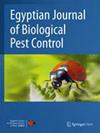Bacteriophages: an overview of the control strategies against phytopathogens
IF 2.1
3区 农林科学
Q1 ENTOMOLOGY
引用次数: 0
Abstract
Abstract Food demand is directly associated with the human population. Due to various plant diseases, there has been a reduction in crop yield. There is an extreme necessity to low such losses in crop yield to meet the rising demand for food. Novel and eco-friendly control approaches should be developed for combating bacterial diseases of crops. Recent control strategies that involve the usage of antibiotics or chemicals are no more effective because of resistance developed by bacterial species. Furthermore, the usage of such agents has proven to be not environmentally friendly. To overcome these issues, bacteriophages are used as an alternative solution. Phages are viruses that attack specific bacterial species, and within current years much consideration is received by them in controlling different diseases caused by bacteria. Phages can be used for controlling different crop-related diseases. Several phage-based products are accessible in the market. Compared to chemical control methods, phage biocontrol offers several advantages. Mixtures of phages can be employed to target pathogenic bacteria. Unlike chemical control strategies, phage mixtures can be readily adjusted to counter any potential resistance. This review summarizes the use of phages as a biocontrol agent against phytopathogens.噬菌体:植物病原体控制策略综述
粮食需求与人口直接相关。由于各种植物病害,农作物产量下降了。为了满足日益增长的粮食需求,极有必要降低作物产量的这种损失。应该开发新的、生态友好的防治方法来防治作物细菌性病害。由于细菌种类产生耐药性,涉及使用抗生素或化学品的最近控制策略已不再有效。此外,这类药剂的使用已被证明是不环保的。为了克服这些问题,噬菌体被用作替代解决方案。噬菌体是一种攻击特定细菌种类的病毒,近年来,它们在控制由细菌引起的各种疾病方面受到了广泛的关注。噬菌体可用于控制不同的作物相关疾病。市场上有几种基于噬菌体的产品。与化学防治方法相比,噬菌体生物防治具有几个优点。噬菌体混合物可用于靶向致病菌。与化学控制策略不同,噬菌体混合物可以很容易地调整以对抗任何潜在的抗性。本文综述了噬菌体作为植物病原菌生物防治剂的研究进展。
本文章由计算机程序翻译,如有差异,请以英文原文为准。
求助全文
约1分钟内获得全文
求助全文
来源期刊
CiteScore
4.90
自引率
16.70%
发文量
128
审稿时长
>12 weeks
期刊介绍:
The Egyptian Journal of Biological Pest Control is a periodic scientific journal published by the Egyptian Society for Biological Control of Pests (ESBCP) in collaboration with SpringerNature. The journal aims to publish internationally peer-reviewed, high-quality research articles in the field of biological and integrated pest control (non-chemical control). The journal publishes review articles, original papers, conference reports, book reviews, editorials, laboratory reports, technical notes and short communications.

 求助内容:
求助内容: 应助结果提醒方式:
应助结果提醒方式:


